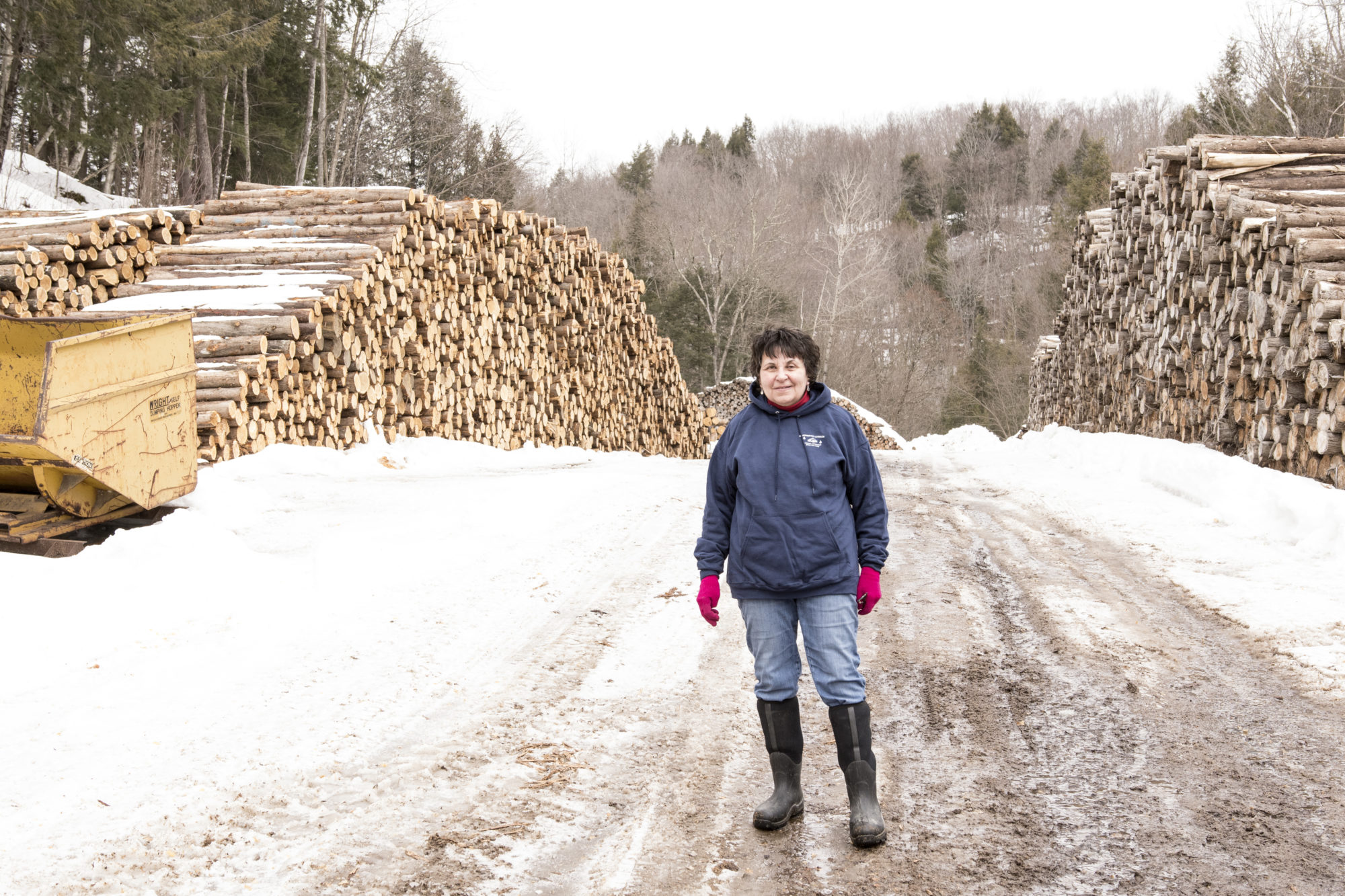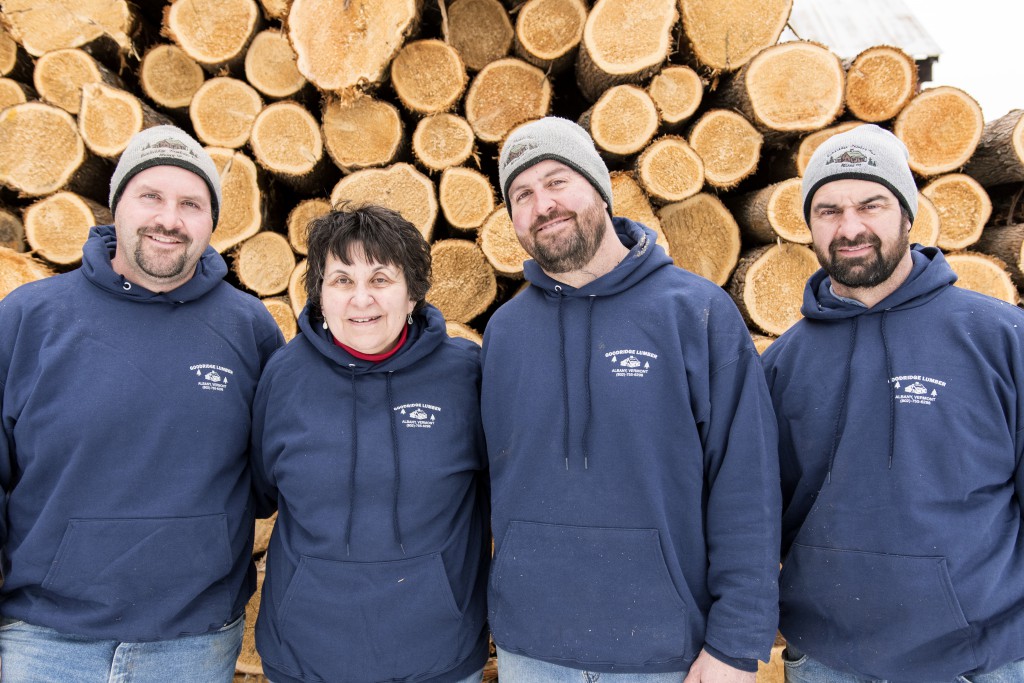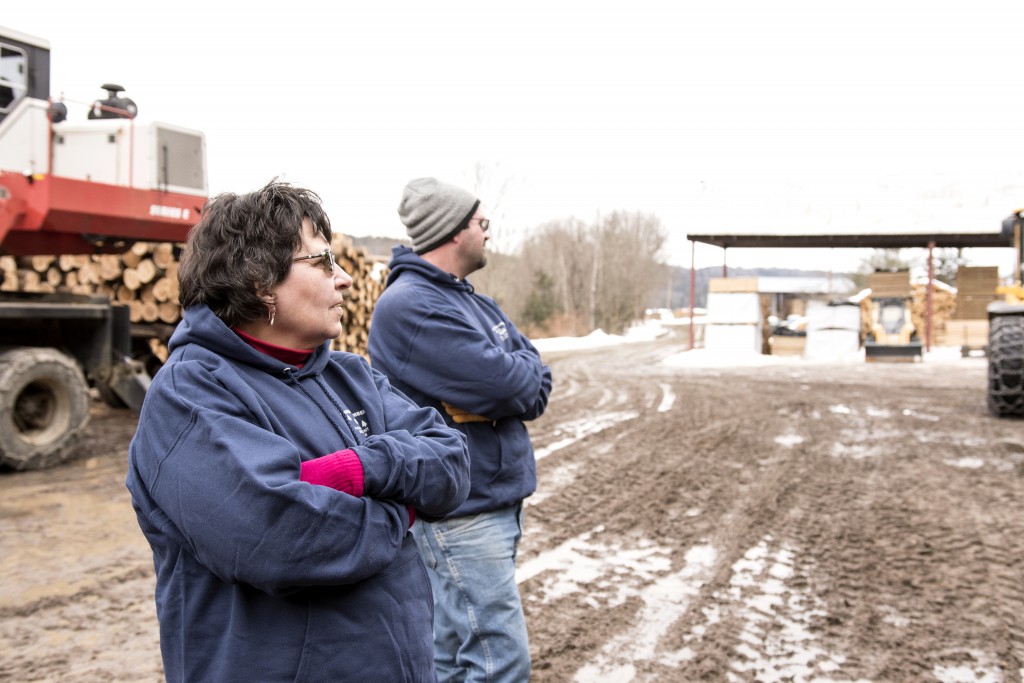Colleen Goodridge, The Matriarch of Vermont’s Forest Industry
April 13, 2018

By Christine McGowan, Forest Program Director, Vermont Sustainable Jobs Fund
April 13, 2018
While an aging industry struggles with succession, Colleen Goodridge cultivates the next generation through education, relationships.
Every industry needs a matriarch, and Vermont’s forest products industry has Colleen Goodridge.
Goodridge Lumber, owned and operated by Colleen and her sons, began in 1973 when the family decided to build a log home. They bought an old saw for $500, borrowed a tractor from the farmer next door, and started pulling trees out of the woods. As they sold logs to pay for repair parts on the saw, and eventually their own tractor, they realized they had a business opportunity.
Today, Colleen and her three sons, Doug, Mark and Brian, have found their niche in cedar, a naturally rot and disease resistant wood that grows in the wet, swampy land surrounding their mill in Albany, VT. Goodridge Lumber produces more than one million board feet of cedar every year, all harvested within a 75-mile radius.
All in the family
In the early days, the boys were given simple jobs like stacking boards and sweeping. Today, Doug, with a degree in civil engineering, does the sawing. Mark takes the lead in planing, operations and maintenance, and Brian is in charge of the log yard, overseeing unloading, buying and scaling. “He’s also the best on machinery,” boasts Colleen, his mom. The four grandchildren have taken over the tasks of cleaning and stacking lumber, but it’s clear that everyone in the family has a role, and Colleen is the matriarch. In an aging industry, the Goodridge family has a prized asset: a clear succession plan.

Colleen Goodridge, center, with her sons Brian, Mark, and Doug at their white cedar sawmill in Albany.
As Vermont’s workforce gets older, the forest products industry faces a shortage of workers. Like many farms in Vermont today, the tradition of taking over the family business is more the exception than the rule. Colleen believes that the industry is at a critical point. “We need a new workforce,” she said. “These are good, valuable jobs and they are necessary. Forests need to be managed for productivity and longevity, not just for timber products but also for wildlife, clean water, clean air, and recreation.”
As if on cue, Jim LaBounty and his son Alex pull into the yard to make a delivery. Like the Goodridges, LaBounty Logging will stay in the family. Alex, who had a full scholarship at Lyndon State College to study criminal justice, has returned to the family business to work alongside his father. “He gave it up to be in the woods,” Jim said with a smile, “because that’s where his heart is. He loves it.”
Changing perceptions and building relationships
Succession plans within the family, however, are few and far between. Like the agriculture industry, young people in forestry have chosen to leave Vermont to pursue other careers and futures. But Colleen thinks this could change with a better understanding of the job opportunities within the industry. “You can be a wildlife biologist, a mechanic, a logger, a woodworker…there are good jobs here.”
As a former teacher and school board member, Colleen is working to educate the next generation about those opportunities and to change the perception of forest industry jobs. She meets with students from the North Country Career Center, as well as with local kindergarten classes who come to the mill for field trips. Goodridge Lumber is even featured in a children’s book, “Knuckleboom Loaders Load Logs,” a captivating read for any young child obsessed with big machines, and all her young visitors leave with their own copy.
While those seeds begin to take root among the next generation, Colleen points to building good relationships with the tight-knit family of Vermont landowners, foresters, loggers, truckers, and mill owners to find a successor. The Goodridges rely on a network of more than 100 of these suppliers to keep their operation running. “They are like extended family,” said Colleen. “You won’t find better people. Anything you need, they are there in a minute.”
New markets for cedar

Colleen Goodridge and her son Brian, watch operations at the family’s sawmill in Albany.
Colleen’s son, Brian, agrees. He also points to finding new and better markets for wood products to keep the business viable. While their main market for cedar continues to be home construction and fencing, they strive to use each log to its most profitable potential. In 1992, Goodridge installed a wood chipper to take advantage of growing interest in natural materials for landscaping. Brian points to an enormous pile of cedar wood chips headed to a garden center for mulch that will help them realize added income for the business. Goodridge also partnered with a pallet company in Southern Vermont in need of certain lower grade boards for pallet construction. In addition to finding new markets, they look for opportunity to add value to their products on site. New tooling and knife components for the planer allow the Goodridges to produce 2×6 machined log siding, a specialty product with a much greater profit margin. “We use the whole tree, there is no waste. That’s partly because it’s the right thing to do, and partly because we can’t afford not to,” said Brian.
“The costs of operating a business are always increasing,” said Colleen. “It’s a challenge to stay healthy and viable, but our farms and forests are part of our core values as Vermonters.”
Vermont Forest Industry Network
Vermont’s forest products industry generates an annual economic output of $1.5 billion and supports 10,000 jobs in forestry, logging, processing, specialty woodworking, construction and wood heating. The new Vermont Forest Industry Network creates the space for industry professionals from across the entire supply chain and trade association partners throughout the state to build stronger relationships and collaboration throughout the industry, including helping to promote new and existing markets for Vermont wood products, from high quality furniture to construction material to thermal biomass products such as chips and pellets. Learn more or join at www.vsjf.org.




